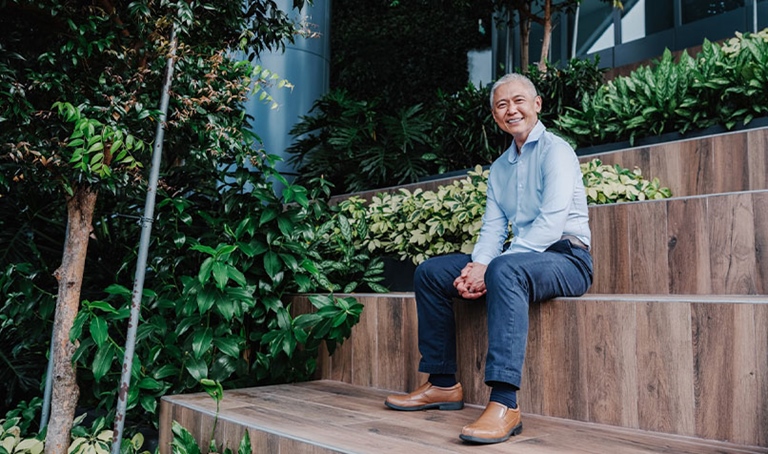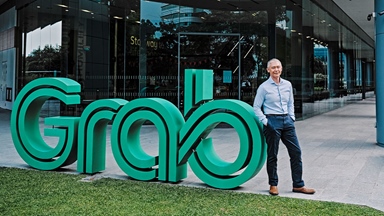Loading component...
At a glance
- Peter Oey FCPA is CFO of Singapore-based tech company Grab, which went public in 2021.
- Oey works closely within the business on balancing compliance, internal controls and risk management.
- He highlights the link between grabbing every business opportunity and creating a global vision.
My role: going public
Since we took Grab public on the Nasdaq three years ago, I have become more involved in investor relations and capital markets. As the CFO of a public company, I am managing a new broad set of investors globally, and a lot of my time is spent managing shareholders’ and investors’ expectations.
I am deeply embedded in the business – working closely with its strategic aims and constantly assessing which levers to pull in driving the business forward.
At the same time, I am balancing compliance, strong internal controls and risk management, which are stipulated by the local regulators and the SEC in the US.
Some things remain the same in both public and private thinking. Finance plays its natural role in gaining insights into the business to make better decisions.
I am always looking at ways to improve capital allocation, provide key business insights and be the financial steward of the business. I do not think that changes when pivoting from the private to the public sphere.
The level of rigour – when it comes to internal controls – has not changed either. Taking care of the nuts and bolts related to running a company remains critical. Based on my experience in former positions, this is one core value I believe I have added to this company.
As capital becomes scarce and more expensive, the mindset of tech companies has begun to change. There is no longer a grow-at-all costs mentality.
In the past couple of years, we witnessed the more disciplined companies balance growth and profitability, setting themselves apart from those that did not.
Profitability is now a critical value. At Grab, we have always known that we needed to get there not long after going public.
Getting profitable does create a level of freedom for the business, but we also need to generate more free cash flow, either to be returned to shareholders or to reinvest to stimulate growth.
I am a big believer in balanced, sustainable growth with a level of high profitability in the business, but that is where most CFOs struggle. How much of your profit do you allocate to growth? That is the nub of my role.
Game changers: global vision
Working abroad has been the biggest game changer for me. I left Australia on two occasions (in 2000 and in 2006) to work in London. In 2006, I moved to California, and in the past five years, I have been working in Singapore and South-East Asia.
If I were to give one piece of advice to other up-and-coming CFOs – or even to my team – it would be to take every opportunity to go outside your comfort zone and go abroad.
I have seen how Europe and the US work, and now I am experiencing the way South-East Asia does business. This helps you to adapt to any situation, it makes you more flexible at solving problems, and it affects how broadly you think when making decisions. It is the result of being subjected to different cultures, jurisdictions and personalities.
"I am a big believer in balanced, sustainable growth with a level of high profitability in the business, but that is where most CFOs struggle. How much of your profit do you allocate to growth? That is the nub of my role."
Thomas Tippl, the previous CFO at Activision Blizzard taught me about the importance of an operational CFO with intensity and rigour – one who rolls up their sleeves and goes deep into the business. I have to nominate his influence as a game changer too.
Some resist being pushed, and yet that is what Thomas did. I gladly accepted all the challenges he put in front of me. His standards were very high, and you could either buckle or thrive under the stress.
I chose to thrive. Much of the way I now operate as a CFO is a result of what I learnt from Thomas.
My challenges: managing complexity

We are a company that deals with ride hailing, food delivery and financial services. These are unique businesses with vastly different parameters. No one else in the region performs on a scale like Grab. We operate in over 700 cities across eight countries.
It is well known that financial services is heavily regulated. Although that comes with its own set of challenges, it is just one part of it. The regulation for each part of the business differs, and the business overall is regulated by the US SEC.
Grab is undoubtedly a complex and complicated business with its unique lines that each carry a different set of regulations and the fact that we operate in and are regulated by eight different countries.
The industry is competitive, so we also must deal with the big shifts in tech. Tech changes quickly and with a business of roughly 10,000 employees, you have to be agile. We are not a small company, and I have watched our ways of doing work change at different times.
There are many local nuances we need to understand and adapt to, including many local languages, but we like to think we have that covered. We run a hyper-local business where our products are adapted to each city in which we operate. That is a challenge we have met head on.
Top CFO skills for 2024
Lessons I have learned
- Work deep within the business: Stay close to your board, key shareholders and investors to manage expectations.
- Create a global vision: Be bold and open to taking on new roles or stretched opportunities – home or abroad.
- Always thrive: Be curious, welcome challenge and switch on your learning mode.
- Become a game changer: Create a legacy for the next generation of leaders.

